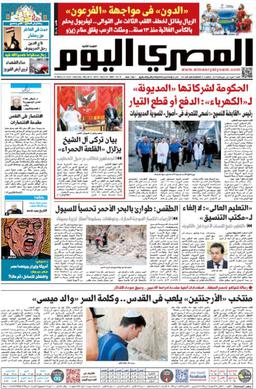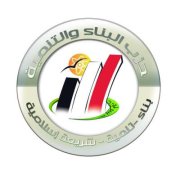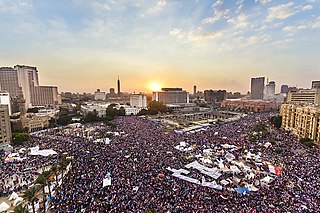Liberalism in Egypt or Egyptian liberalism is a political ideology that traces its beginnings to the 19th century.

Al-Masry Al-Youm is an Egyptian privately owned daily newspaper that was first published in June 2004. It is published in Arabic as is its website, almasryalyoum.com. An English version of the website was introduced in 2009 as the Al-masry Al-youm English Edition, which later evolved into Egypt Independent. It strives to be a full-service multimedia news organization for Egypt.

Presidential elections were held in Egypt in 2012, with the first round on 23 and 24 May 2012 and the second on 16 and 17 June. They were the first democratic presidential elections in Egyptian history. The Muslim Brotherhood declared early 18 June 2012, that its candidate, Mohamed Morsi, won Egypt's presidential election, which would be the first victory of an Islamist as head of state in the Arab world. It was the second presidential election in Egypt's history with more than one candidate, following the 2005 election, and the first presidential election after the 2011 Egyptian revolution which ousted president Hosni Mubarak, during the Arab Spring. However, Morsi's presidency was brief and short-lived, and he later faced massive protests for and against his rule, only to be ousted in a military coup in July that year.
The al‑Nour Party, or "Party of The Light", was one of the political parties created in Egypt after the 2011 Egyptian Revolution. It has an ultra-conservative, Islamist ideology, which believes in implementing strict Sharia law. It has been described as the political arm of the Salafi Call Society, and "by far the most prominent" of the several new Salafi parties in Egypt, which it has surpassed by virtue of its "long organizational and administrative experience" and "charismatic leaders". Its political aim is to establish a theocratic state on the lines of Wahhabism like in Saudi Arabia. Saudi Arabia was found to be the main financer of the party according to the public German television news service ARD.

Mohamed Mohamed Morsi Eissa al-Ayyat was an Egyptian politician, engineer, and professor who was the fifth president of Egypt, from 2012 to 2013, when General Abdel Fattah el-Sisi removed him from office in a coup d'état after protests in June. An Islamist affiliated with the Muslim Brotherhood organization, Morsi led the Freedom and Justice Party from 2011 to 2012.

The Building and Development Party is an Islamist political party in Egypt.

The Egyptian Constituent Assembly of 2012 (CA) is the committee for the creation of a new Constitution of Egypt. The Muslim Brotherhood had announced that the Constituent Assembly would vote on the constitution on 29 November 2012. The Constituent Assembly will be able to avoid its possible dissolution by voting on the constitution earlier than the release of a ruling by the Supreme Constitutional Court on the assembly's legitimacy; the ruling was expected to occur on 2 December 2012. The court has postponed the verdict in response to protests. The Constituent Assembly approved the constitution on 29 November 2012; more than 16 hours were spent voting on its articles.

The Constitution Party is a political party in Egypt. Founded by Nobel Peace Prize laureate Mohammad ElBaradei in 2012, it aims to protect and promote the principles and objectives of the 2011 Egyptian revolution, according to liberal ideals.

The following is a chronological summary of the major events that occurred after the Egyptian Revolution of 2011, after Mohamed Morsi's election as the fifth President of Egypt, on 30 June 2012. This article documents the third wave of the Egyptian Crisis.

The 2012–2013 Egyptian protests were part of the crisis in Egypt including the June 2013 protests, the July 2013 coup d'état, and part of the post-coup unrest. They saw varying opposition against three contiguous heads of state; namely, the Supreme Council of the Armed Forces (SCAF), Muslim Brotherhood, and the de facto ruling Egyptian Armed Forces.

George Isaac was an Egyptian politician and activist. During the later part of Hosni Mubarak's presidency, he co-founded the grassroots Kefaya opposition movement.

Tamarod was an Egyptian grassroots movement that was founded to register opposition to President Mohamed Morsi and force him to call early presidential elections. The goal was to collect 15 million signatures by 30 June 2013, the one-year anniversary of Morsi's inauguration. On 29 June 2013 the movement claimed to have collected more than 22 million signatures (22,134,460). A counter campaign was launched in support of Morsi's presidency which claimed to have collected 11 million signatures. The movement was planning to become a political party following the 2014 Egyptian presidential election.

The Anti-Coup Alliance is a coalition in Egypt formed to reverse the ouster of former president Mohamed Morsi. The coalition is made up of approximately 40 Islamist parties and groups.

The 30 June revolution occurred in Egypt on 30 June 2013, marking the one-year anniversary of Mohamed Morsi's inauguration as president. The events ended with the 2013 Egyptian coup d'état after mass protests across Egypt demanding the immediate resignation of the president. The rallies were partly a response to Tamarod, an ostensibly grassroots movement that launched a petition in April 2013, calling for Morsi and his government to step down. Tamarod claimed to have collected more than 22 million signatures for their petition by June 30, although this figure was not verified by independent sources. A counter-campaign in support of Morsi's presidency, named Tagarod, claimed to have collected 26 million signatures by the same date, but this figure was also unverified and not mentioned in media nearly as much as Tamarod's, with no reliable sources repeating it. The movements in opposition to Morsi culminated in the June 30 protests that occurred across the country. According to the Egyptian military, which calculated the number of protesters via helicopter scans of demonstration perimeters across the country, the June 30 protests had 32 million protesters, making them "the biggest protests in Egypt's history." However, independent observers raised concerns that the Egyptian government exaggerated the actual number of anti-Morsi protestors, with some research determining that only around one to two million people protested across the country against Morsi.

Protests against the 2013 Egyptian coup d'état erupted in July 2013. Immediately following the removal of President Mohamed Morsi by the Egyptian Armed Forces on 3 July 2013 amid demonstrations against Morsi's rule, many protesters amassed near the Rabia Al-Adawiya Mosque to call for Morsi's return to power and condemn the military, while others demonstrated in support of the military and interim government. Deadly clashes such as Rabaa massacre continued for several days, with three particularly bloody incidents being described by officials as "massacres" perpetrated by security forces. During the month of Ramadan, prime minister Hazem al-Beblawy threatened to disperse the ongoing Pro-Morsi sit-ins in Rabaa al-Adaweya square and al-Nahda square. The government crackdown of these protests occurred in a violent dispersal on 14 August 2013. In mid-August, the violence directed by the army towards the protesters escalated, with hundreds killed, and the government declaring a month-long nighttime curfew.
On the morning of 8 July 2013 at the Republican Guard headquarters in Cairo, Egypt there was a clash between protesters seeking the return of deposed President Mohamed Morsi, and the military, who were protecting the institution. According to the Forensic Medical Authority, at least 61 protesters seeking the return of Morsi to power were killed and more than 435 injured in the clashes, in what has been deemed a massacre by the Muslim Brotherhood and those opposed to the recent coup d'état. Amnesty International has condemned the military's disproportionate use of force, with a spokesperson stating, "Even if some protesters used violence, the response was disproportionate and led to the loss of life and injury among peaceful protesters."
Mohamed Abu Samra is the current secretary-general of the Islamic Party, which is the political arm of Egyptian Islamic Jihad. Abu Samra stated in an interview in April 2013 that the Muslim Brotherhood was not successful in applying Sharia and that he supported the changing of the government. However, in an interview with Cairo Al-Akhbar, he called for a revolt if President Mohamed Morsi was deposed. As of September 2013 he was calling for peaceful protests and disavowed the actions of jihadist groups in the Sinai. He called on Egyptian judges to adhere to the law by stopping their strike that occurred in 2012. Abu Samra said that he would be opposed towards returning Israeli Jews of Egyptian descent to Egypt in response to a comment made by Essam el-Erian, a member of the Freedom and Justice Party and an adviser to then president Mohamed Morsi; he also stated that according to Sharia law, Jews deserve to be fought and killed by Muslims.

The Rabaa or Rabbi'ah sign - often stylized as R4BIA or less commonly as Rab3a, is a hand gesture and a sign that first appeared in late August 2013, thought to have originated from Turkey and used in social media and protest marches in Egypt. It is used by the Muslim Brotherhood and its supporters in Egypt in the wake of the overthrow of Mohamed Morsi, which occurred after anti-government protests calling for his removal. On July 9, 2014, a Brotherhood-affiliated organization declared August 14, the day when the sit-ins were dispersed, "World Rabia Day," in an attempt to garner support across numerous countries.
The Moderate Front is an alliance composed of former jihadis, ex-members of the Muslim Brotherhood and ex-al-Gama'a al-Islamiyya members. The leader of the alliance is Sabra al-Qasemy al-Wasateyya, who was a former member of Egyptian Islamic Jihad. The alliance was founded after the 30 June ouster of Mohamed Morsi and subsequent attacks on civilians. The coalition has supported Abdel Fattah el-Sisi for president in the Egyptian 2014 presidential election. The Muslim Brotherhood has been criticized by the group for its calling for protests on the anniversary of the Mohamed Mahmoud clashes; the members of the alliance want the Brotherhood to turn away from violence. One of the members of the organization, Amr Emara, is also the coordinator of the Dissident Brotherhood Youth Alliance. The leader of the Democratic Jihad Party is currently a member of the front.











